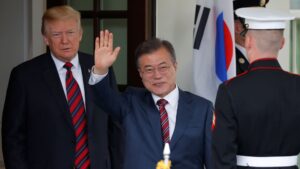—
# Navigating the Shift: Potential Impacts of Trump’s Tariff Talks on the US Auto Industry
As the global automotive landscape evolves, the potential threat of increased tariffs on foreign imports, particularly from South Korea and Japan, could have far-reaching implications for the U.S. auto industry. At Extreme Investor Network, we’re here to unpack the nuances of this development and provide insights that can aid investors in navigating these choppy waters.
## The Current Tariff Landscape
President Donald Trump has been vocal about his desire to impose additional tariffs on U.S. trading partners. The most significant impact could likely be on vehicles imported from South Korea and Japan. In fact, these two East Asian nations accounted for 16.8% of all vehicles sold in the U.S. in 2023, with South Korea alone contributing an impressive 8.6%. These countries have become the largest suppliers of vehicles to the U.S. outside of Mexico, which represented 16.2% of auto sales during the same period.
This situation is further complicated by the fact that both countries currently benefit from low or no tariffs compared to the 25% levies threatened against Canada and Mexico. For automakers like General Motors and South Korea’s Hyundai Motor, the stakes couldn’t be higher, as they exploit this leniency to export large volumes of vehicles into the U.S. market.
## The Growing South Korean Presence
Hyundai has seen remarkable growth, emerging last year as the second-largest exporter of new cars to the U.S., even surpassing Japan. In 2023, South Korean design and engineering translated to over 1.37 million auto sales in the U.S., a significant increase from less than 845,000 in 2019.
GM has also ramped up its import of South Korean-made vehicles, emphasizing the importance of entry-level models to its portfolio. That’s led to a staggering rise in sales—up from 173,000 in 2019 to allegations of more than 407,000 last year. This trend indicates a robust market strategy focusing on affordable vehicles amid a consumer shift towards cost-effectiveness.
## The Ripple Effects of Tariff Changes
Experts are already raising concerns about how additional tariffs might influence the market. While automakers often have the flexibility to adapt, the reality remains that large-scale changes can take time to implement. Tariffs act as a tax on imports—costs that manufacturers traditionally pass down to consumers in the form of higher prices. Hence, any significant increase could lead to decreased demand in a market already facing economic headwinds.
Additionally, the automotive sector’s focus on free trade means that any threat of tariffs could deter investment and innovation. Terence Lau, Dean of the College of Law at Syracuse University and a former trade expert at Ford, expressed concerns about how the industry could respond to sudden changes. He noted that lower tariffs might be manageable, but once they reach 10% or more, they begin to eat into profit margins significantly.
## The Call for Comprehensive Policies
Ford CEO Jim Farley recently advocated for a comprehensive approach if tariffs are to be enacted. He underscored the need for an all-encompassing strategy that doesn’t cherry-pick countries, thereby ensuring a level playing field in the competitive North American market.
The conversation gets even harder as companies are now tasked with a balancing act of maintaining costs while striving for quality and demand. As he succinctly put it during a recent earnings call, “We can’t just cherry-pick one place or the other because this is a bonanza for our import competitors.”
## The Bigger Picture
While the situation remains dynamic, investors, automakers, and customers alike must closely monitor how these tariff discussions unfold. The automotive landscape is largely influenced by global economics—any shifts in trade policy can ripple through manufacturing, sales, and ultimately consumer costs.
At Extreme Investor Network, we believe understanding these nuances and their potential impacts is crucial for making informed decisions. We will continue to provide the latest insights and analyses to help you navigate these tides—whether you are an investor, manufacturer, or enthusiast of the automotive industry.
Stay informed and engaged with us at Extreme Investor Network as we keep an eye on this important story.
—
By presenting unique insights and focusing on the future implications of current events, this blog format emphasizes why readers should choose Extreme Investor Network for their business news needs.

